#Tudor court
Explore tagged Tumblr posts
Text
Hans Holbein, Holbein at the Tudor Court, Queen's Gallery, London, 2024


















#hans holbein the younger#Queen's Gallery#buckingham palace#london#painting#tudor court#thomas more#jane seymour#anne boleyn#edward vi#elizabeth i
7 notes
·
View notes
Text
"The court is rife with intrigue and betrayal, with everyone seeking to secure their own position and avoid the King's wrath." (Letter to Charles V, 1537)

Eustace Chapuys, the son of Louis and Guigonne Dupuys, was a Savoyard diplomat who served Charles V as Imperial ambassador to England from 1529 until 1545 and is best known for his extensive and detailed correspondence.
Born: 1489, Annecy, Annecy, France Died: 21 January 1556 (age 67 years), Leuven, Belgium
#Diplomat#Ambassador#Spanish envoy#Tudor court#Henry VIII#Anne Boleyn#Catherine of Aragon#Reformation#Imperial ambassador#Holy Roman Empire#Renaissance politics#Chronicler#Historical figure#16th century#Court intrigues#Religious conflict#Political maneuvering#Habsburg representative#English Reformation#European diplomacy#quoteoftheday#new blog#today on tumblr
2 notes
·
View notes
Text
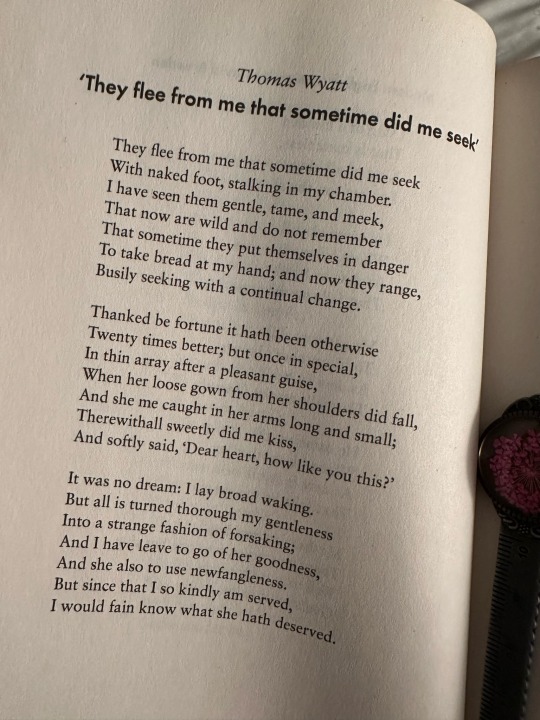
They flee from me sometime that did me seek by Thomas Wyatt
#alliwanttodoiscollectpoetry#poem#poetry#poems#poet#poets#anthology#tumblr poetry#poem of the day#poetry blog#they flee from me that sometime did me seek#thomas wyatt#poemblr#poetblr#Tudor#Tudor court#deer#poemsdaily#poems and poetry#literature#love#courtship#poetic#poetry on tumblr
5 notes
·
View notes
Text

Hans Eworth, Portrait of Mary Fitzalan, Duchess of Norfolk
0 notes
Text
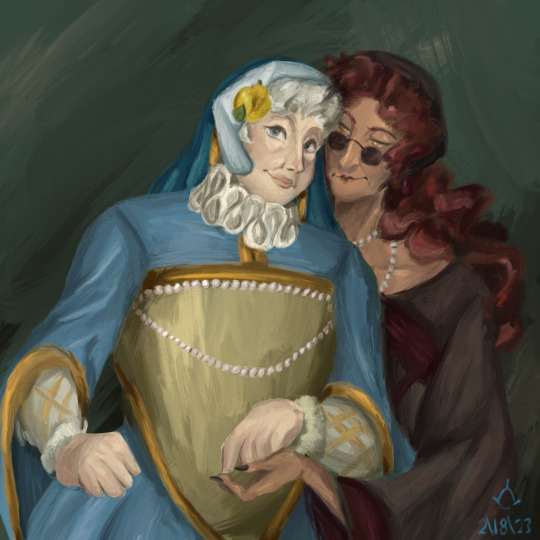
The Venetian Lovers by Paris Bordone repainted with the lovely (ineffable) ladies of the court, tudor designs courtesy of @dingledraw!!
i haven’t been able to stop thinking about the tudor wives since i read the comics of featuring their character designs, hope i did it justice!
#art by me#fanart#painting#good omens#good omens 2#aziraphale#crowley#fem aziraphale#fem crowley#ineffable wives#tudor#tudor fashion#The Venetian Lovers#ineffable ladies of the court#this was so much fun to do honestly#michael sheen#david tennant
313 notes
·
View notes
Text








wordyelaine
Barrington Court
#Barrington Court#country living#country life#country aesthetic#summer aesthetic#country summer#english manor#english countryside#english garden#Tudor manor house#Somerset#england
105 notes
·
View notes
Text
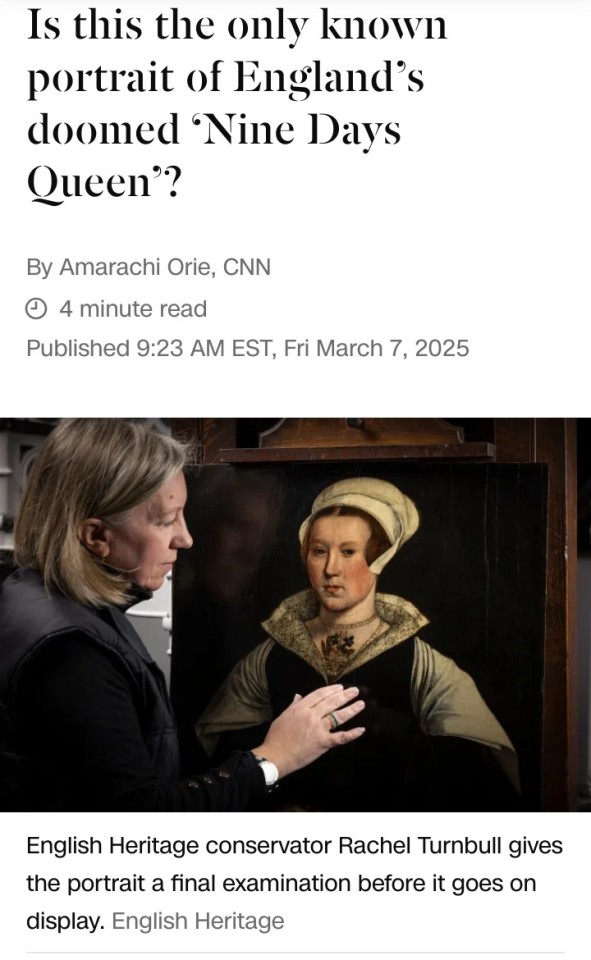



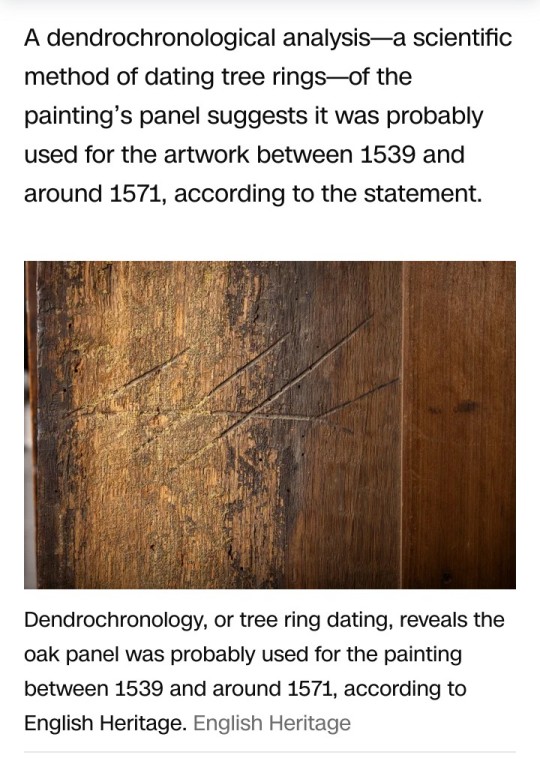





—
Lady Jane Grey (1536/7 – 12 February 1554), also known as Lady Jane Dudley after her marriage, and nicknamed as the "Nine Days Queen," was an English noblewoman who was proclaimed Queen of England and Ireland on 10 July 1553 and reigned until she was deposed by her cousin, Mary I, on 19 July 1553.
#lady jane grey#nine days queen#henry VIII#british royal family#the tudors#tudor era#english heritage#edward VI#mary tudor#anthony grey#11th earl of kent#courtauld institute of art#dendrochronology#dendochronological analysis#tree ring dating#tree rings#baltic oak#infrared reflectography#wrest park#bedfordshire#england#royal court#house of tudor#lady jane dudley
23 notes
·
View notes
Text

Chapter 2 of Valor Ecclesiasticus is up on AO3
Stephen begins his memoir with a romantic tale, with an intermission to address the ghosts in the room.
Huge thanks to @liliana-von-k, for her help with this project. :D
#Valor Ecclesiasticus#Mischellany#Thomas Cromwell#Stephen Gardiner#Elizabeth Caley (OC)#John Caley (OC)#First two chapters Generic fic rated G#Wolf Hall#Henry VIII#Henrician Court#The Tudors#gen fic
27 notes
·
View notes
Text




My favorite costume: Landesknecht Jester!!!
I made this in 3 weeks for the Elfia festival and i’m SO stoked with how it turned out. I felt like such a goblin (positive) and it was so comfortable!!
Patterns were based on the women’s doublet and men’s trunk hose from The Tudor Tailor, while the leggings are a free pattern (Ninja Leggings by 4 out of 5 patterns). Headdress is completely self-drafted!!
#renaissance#tudorfashion#the tudor tailor#4outof5patterns#costuming#ren faire#renfaire costume#1500s#fantasy costume#court jester#landesknecht
21 notes
·
View notes
Text
How to tell if you are in Henry VIII's court:-
There is...
Henry VIII (back away slowly)
his wife, who deserves better (statistically it'll be Katherine of Aragon, but whichever one it is, she deserves better)
one or more hyper-competent arseholes called Thomas (who also frankly deserve better than what happens to them, but they are still arseholes, and they are all called Thomas)
depending on the year, there may also be the Duke of Norfolk in the middle of totally selling out one of his nieces
and finally Spanish ambassador Eustace Chapuys, being extremely snarky in all of his letters
On the upside, depending on the year there may be some absolutely banging music, but is it worth it? No.
#english history#henry viii#if it's before flodden you're probably better off at james iv's court instead#six wives#six wives of henry viii#tudor history#history shitposting
67 notes
·
View notes
Text
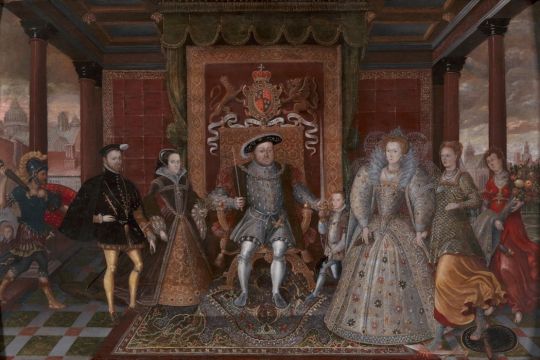
An Allegory of the Tudor Succession
Artist: Unknown artist, Formerly unknown artist sixteenth century after Lucas de Heere (1534–1584)
Date: c. 1590
Medium: Oil on panel
Collection: Yale Center for British Art, New Haven, CT, United States
Depicted People
William Sommers, Court fool
Henry VIII (1491–1547), King of England and Ireland
Philip II, King of Spain (1527–1598)
Elizabeth I (1533–1603), Queen of England and Ireland Mars
Mary I (1516–1558), Queen of England and Ireland
Edward VI (1537–1553), King of England and Ireland
#painting#allegory#oil on panel#henry VIII#philip II#elizabeth I#mary I#edward VI#king#queen#court fool#brocade#child#cityscape#coat of arms#costume#family#group portrait#fruit#guards#historical subjects#jester#peace#plenty#royalty#throne#tudor#war#rub#artwork
17 notes
·
View notes
Text
It just occurred to me that we've not had an in depth portrayal of Henry VIII and Jane Seymour since the Tudors. Or just, Jane Seymour in general. So I am really curious to see how Mirror and the Light/Wolf Hall is going to handle them.
We get to know about her family, we'll learn about Elizabeth Seymour as well, and how important she is.
#and maybe we have I just haven't seen#most of the portrayals of jane are very much her being viewed as the 'other woman'#which isn't at all fair#she is never truly given her own type of spotlight#at least until like i said#the tudors#and there is either over pacification of her or over villainization of her#and by pacification - i mean people just portray her as a mindless doe like character#who has no type of motives or goals of her own#when it was her who worked tirelessly to introduce mary back to court#and it was her who was sympathetic to the catholics and the pilgrimage of grace#anywayzzzz#can't wait to see how wolf hall handles her#and if this is going to be a type of portrayal that is everlasting - like the tudors#jane seymour#wolf hall#henry viii#mirror and the light#i do know that most of the focus in the new series is going to be Thomas Cromwell - whom I am obsessed with to the point of#I think it's best not to talk abt him or y'all would look at me weirdly#but what I'm saying is i'm not going to expect *too* much#because the tudors was really focusing on the queens and not the courtiers#and mirror and the light's main focus is certainly the courtiers
18 notes
·
View notes
Text




I think about sometimes how 2000s Scarlett Johansson would've been better cast as Catherine Howard in a different Tudor drama than Mary Boleyn in The Other Boleyn Girl if you believe the Portrait of a Young Woman, by Hans Holbein the Younger, is Catherine.
#i think the 4th pic is Scarlett from the 90s tho?#but i really do believe that Holbein portrait is Catherine because the lady looks to be closer to in age to when she entered court#the other famous portrait alleged to be her looks a bit more like Anne of Cleves in the English court style#my vision would be to portray Catherine not as a dumb silly girl but a young survivor trying her best to be a good queen#but since Scarlett is too old to play as her now irl i think still fancasting her as Catherine for fics would be great#catherine howard#katherine howard#six wives of henry viii#tudor england#the other boleyn girl#house of tudor#tudor history#mary boleyn#tudor era#tudor dynasty#enyo chat
33 notes
·
View notes
Text
Because I’ve got my finger right on the pulse, I’m gonna make a meandering post about a long-cancelled period drama rather than the major one currently airing. But this has been in the drafts for ages, and yeah I just really didnt like the depiction of Kett’s rebellion in Becoming Elizabeth. And I need to complain about it lol. I wish i could say it was a good effort but im not sure i can even give it that...
a looong post because i cannae haud me wheesht
Firstly, and perhaps one of the most important things, is they have the rebels in the show rally around the cry, ‘kill all gentlemen!’ This wasn't a phrase used by the rebels at the Mousehold camp - it's been attributed to the revolts in the West, but i'd agree with recent research that it doesn't seem to actually have been said by anyone. The sentiment in of itself - the tearing down of the elite class - isn't something expressed in the articles the rebels produced, even if there were underlying tensions between the two groups. You do see it appear in individual testimonies sometimes, like here:
'the pore peple are now Famysshed but C of us wyll rise one daye agenst them & I wylbe one day he'.
I'm also not saying they were nice to the gentlemen they captured, or that they didn't want to confront these landed elites, because they did. But the rebels weren't, as shown in BE, slitting the throats of random nobles they came across. That kind of indiscriminate, murderous loathing isn't something i've seen represented in the sources describing their actions. There were few murders at all committed by the rebels - the battles against crown forces excluded - and fewer still can be confirmed to have been gentry. (although i should point out, whilst I'm focusing on Norwich because the show did, iirc there were killings of elites, and more talk in that sort of vein, in yorkshire). In the south, their violence seems largely to have been aimed at property, and chosen enclosures/deer parks and houses/household goods. that was the consistent thread running through their physical responses. For example:
'So some of the common people rose in Kent, Surrey, and Sussex under a captain they called Common-wealth and made havoc on the wild beasts in many of the parks in these parts. But they paid for their food in every place'.
or,
'they have pluckyd downe Sir Wyllyam Harberde’s parke that ys abowte hys newe howse, and dyverse other parkysse and commonse that be inclosyd in that cuntre, but harme thay doo too parson (nobody).... They saye thay wylle obaye the Kynges maiste and my lord Protector with alle the counselle, but thay saye thaye wyll nat have ther commonse and ther growendes to be inclosyd and soo taken from them.'
and from Holinshed,
'ditches and hedges, wherewith the commons abrode in the countrie were inclosed, were throwne downe'
Their violence was a response to land, economic, religious, as well as highly local factors. To my understanding, it didn't represent a desire to either kill or eradicate gentlemen as a social group. The Norwich articles do suggest aims to minimise their interference in the community, and it did represent a radical restructuring of local rights and spheres of influence - at least, as i understand it.
Again, all this isn't to say there wasn't force, that there wasn't any brutality, or that there wasn't bitterness or resentment directed at elites. To take another example from Holinshed, he describes this killing of an Italian mercenary at Mousehold:
‘but they [Dudley's forces] left one of their companie behind them, a gentleman that was an Italian, who… through euill hap being outherthrowne beside his horsse, he was inuironed about with a great multitude if those rebels, that tooke him prisoner, and like vile wretches spoiling him of his armor and apparell, hanged him ouer the wals of mount Surrie. Which act shewed what courtesie might be looked for at such cruell traitors hands… it seemed that their beastlie crueltie had bereft them the rememberance of all honest consideration and dutifull humanitie’.
Having said that, the way the show presents the rebels' violence seems to me to be unrepresentative. BE depicts an overly simplistic picture of the commons indiscriminately murdering nobles w/o compunction or for any particularly complex reasons. Just, showing these people yanking a random man and woman off their horses to slit their throats and then leaving them to die... it really fucked me off. That is not at all accurate to events or the commons' behaviour during Kett's rebellion. At least, not in any sources that i've read. I mean funnily enough people werent too keen on getting hanged, which goes a long way to explaining why they skewed away from interpersonal violence.
The show also understates the sheer scale of the death toll imo. Not only were significant numbers killed at Dussindale, but a large number were executed after the fact. There was also battles near Exeter, and a great many Cornish were killed - I've come across the number as potentially as many as 2 000 before.
'The knight, hearing of this came with 200 men in harness who by his order attacked the commons and slaughtered them like wolves among sheep'
'During this time the Lord Privy Seal saw his opportunity to attack the besiegers [at exeter] before the Cornishmen arrived and killed more than 5,000. ....Then [at Norwich] the captain and many honest men were hanged, many of them without deserving it for any harm they had done, and some who had not even raised a stick to go to the field'
i don't think the figures have to be understood as being 100% accurate to nevertheless impart the sense of scale.
BE sort of glosses over this, even if it shows a handful of rebel leaders being hanged. Local communities such as Norwich, Yarmouth and others involved would have been greatly effected in terms of the proportion of their population who were now dead.
And the number of people hanged, drawn, and quartered at the market cross in norwich.. it was 30 or so i think? i can't imagine watching all those people be brutally killed on the same spot in one day. There were churchmen hanged from their steeples in various towns (oh how funnily ironic of you!) - this also extended to William, Robert Kett's brother,
'likewise hanged on the toppe of Windham [Wymondham] Steeple'
And, ofc, people's hung, drawn and quartered body parts were placed on the town/city gates. There were hangings in many local areas wherever support for the rebellion had existed.
Rebels were also hanged actually from the oak of reformation, which I’d argue is a fairly pointed inversion and disregard for such a key symbol of the revolt. It strikes me as particularly cruel and dismissive. as in, everything they tried to convey about themselves was shown to be utterly pointless and irrelevant.
memories of all this lasted, as you can imagine, for decades afterwards, like in 1596:
'the people that there [oxfordshire] did Rise were persuaded to goe home, and were after hanged like dogges'
This deficit in the show is seemingly symptomatic of the general under-representation of the sheer scale of what was happening. the number of amassed people shown is miniscule compared not only to the numbers at Mousehold but also those across the south - as well as some disturbances in the north. I feel like this couldve been mentioned in the dialogue since showing all that wouldve been very difficult, as the scale was most likely a budget thing. But showing merely the killing of Kett and a handful of others does the whole sequence of events a terrible disservice.
It also glosses over the extent to which this was a factor in Somerset's fall, and it was a big factor. The nobility felt he was prioritising the commons over their own interest. Paulet wrote in a pretty exasperated way about Somerset’s policies, and ofc Warwick grew increasingly impatient with him. The common people actually rose in decent numbers when he asked them, but Seymour turned them away in the end. I think he likely realised it was a bridge too far. Edward was actually allowed to survive for a short time after the risings, but not by much.
Anyway, overall i felt the show was far too harsh towards the rebels and presented them as very one-dimensional. And on the flip-side if anything it was too kind towards the nobility in its depictions of their response, considering they showed only a few hangings and not the overwhelming scale of death and brutality that followed. It’s been a while since I’ve watched the show, but did they mention the battle at mousehold, even? If not I think that’s diabolical
(As an aside to that last point, I do find John Dudley interesting. And I mention that because I want to be clear, I’m not saying you can’t like these people, or find them fascinating or compelling or moving. But when ‘these people’ are Tudor ministers you have to be prepared that they will have done some terrible things. Whether that behaviour is the ‘norm’ then or not, it still makes for difficult, upsetting reading. And I’m saying this as someone who does find the characters of these v competent/influential ministers really fascinating - like Wolsey, Cromwell, Cranmer, Dudley, Cecil etc. I mean, Cecil in the wake of the northern revolt? Reading those documents makes me feel a bit sick actually. It’s chilling. But anyway, anyone in the court can come under this umbrella to varying extents, but the drivers/orchestrators of policy are obviously - next to the monarchs - at the heart of any brutality…)
#i get it. it’s a show about young Elizabeth#so if there wasn’t time to depict this properly. they’d have been better off sticking to her perspective. or a court perspective anyway#because… there’s not much to commend the portrayal of it#it's just a shame that one of the fleeting glimpses of popular culture afforded in a tudor drama was clearly not given the research needed#like. not even by half#this is a brief whistlestop tour. there's more that could be said and a lot more sources to include. but this is long enough as it is!#period drama#becoming elizabeth#the Tudors#john dudley#edward seymour#kett’s rebellion
8 notes
·
View notes
Text
I've never read The Scarlet Letter and am not familiar with it outside of a one-sentence description but man I wish it were more well known in Germany
Because I find myself hanging out at medieval markets (which are only slightly less fantasy based than ren faires) and in between people doing Vikings (the tv show not the historical people) cosplay in their furs and black eyeliner and dreads or in polyester "medieval princess" gowns on the one hand and memories of studying archaeology and people doing something in between reenactment and experimental archaeology and the snobbery of decrying anything and everything as "not A" (as in authentic)
and also the psychological damage of watching Bernadette Banner explain the difference between s- and z-twisted thread and realising that such a thing as authenticity in a historical context is impossible and
oh I dunno this video is getting to me, like, I am more looking forward to the Heilung concert I have tickets for now than I did before, having won a new appreciation forthe sheer originality and creativity of their sound as well as the diversity of cultural influences being cited but also still feeling that ex-archaeologist sting of "but people are going to believe that's what the past was actually like!"
In short I kind of want to hand stitch a gown to the best of historical informedness and then pin a probably neon pink sign on it saying "not A" as a fun reference to a novel I'll probably never read and a fucking amazing song just to say "I know better and I don't care"
#my own fault for falling in love with a guy who goes to events like that#anyway we were at a renaissance ball last weekend#and idk man the blinged out polyester tudor court gowns without appropriate underpinnings got to me#more so than the fantasy pirate look with a roe deer antler fixed to a headdress#there is no such thing as authenticity I should just relax and have fun#i think what I need to do is buy a pair of blinged out shutter shades and wear them with anything approaching historical inspiredness#also put together an ensemble of quote unquote peasant blouse 17th century stays and victorian walking skirt and combine them with the shad
5 notes
·
View notes
Text
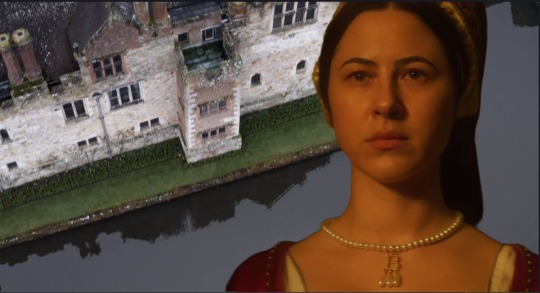
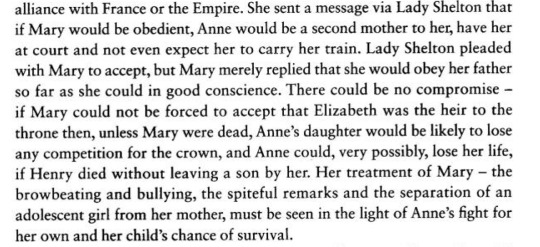
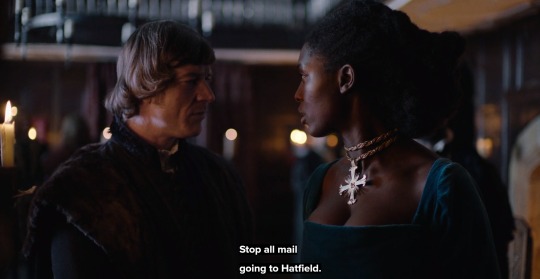
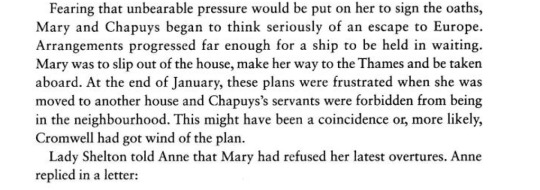
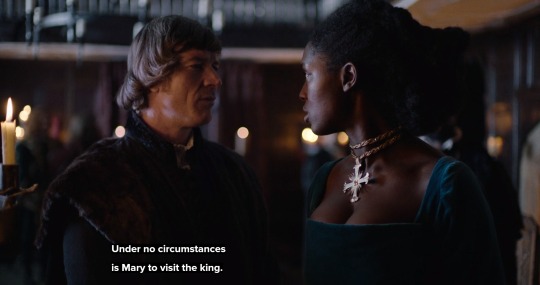
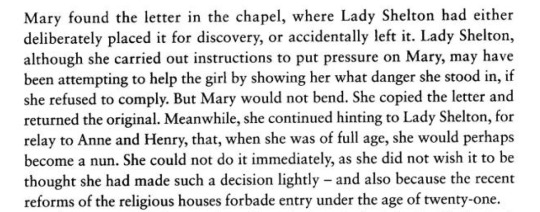
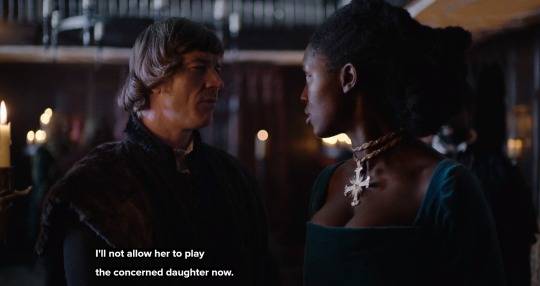
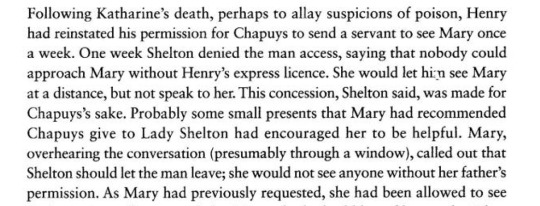
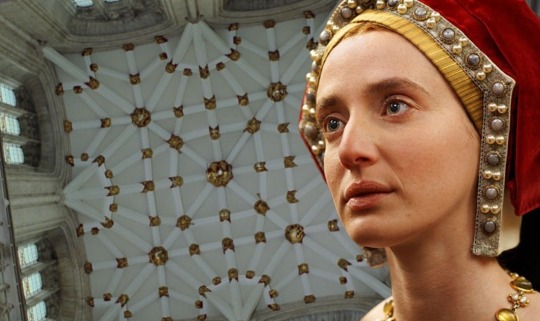
the downfall and execution of a tudor queen (2023) / the boleyns: a scandalous family (2021) / the king's pearl: henry viii and his daughter mary (2017), melita thomas / anne boleyn (tv miniseries 2021) / the mirror and the light (2024) / elizabeth (1998)
#web weaving#sort of?#i never feel like my edits really fit#they're more like collages#anyway...me on my island with the one other tudor fan that liked AB 2021 lol#'our expectations were low but holy fuck' sounds like a lot of consternation about a pretty...solid script?#what i loved most about it was moments like the above#the ability to summarize really complex dynamics borne of circumstance#in such a way that you can believe in the world and it serves as its own 'previously on' that a miniseries inherently lacks#esp when it only covers five crucial months#tl; dr there's a lot of smugness evident in many books of this genre#when it comes to anne's attitude towards her stepdaughter#bcus she was quote proven wrong unquote; becaues mary got quote the last laugh unquote...#when really. as per the quotes i've been posting#it doesn't seem like mary's reconciliation with her father was the idyll many have made it#thus we have anne's letter#and offer. knowing that others are offering her better futures#but saying this is the best future you could have. limited time only.#and it seems the future proved her right; not wrong (at least the immediate future)#bcs while matters; had she accepted; might not've been substantially better than they were under the auspices of a 'more gentle' stepmother#it also doesn't really seem like they would have been substantially worse#anne was right that her enemy's supporters wanted her disgraced and/or dead. she was right in that they wanted elizabeth disgraced#and/or dead. she couldn't have predicted what happened to herself in the exact matter it did- mainly bcus it was unprecedented#but it seems she had a pretty clear view of what mary was doing: playing both sides. attempting to ingratiate herself to her father while#also conspiring against him. and she knew it would have been better to have her on side#(and in a more jaundiced view: have her where she could watch what she was doing; who she was seeing)#but perhaps underestimated how impossible it would be to get her there in the first place#('on side' ; that is. not at court. although probably not that either. with the conditions she demanded)#but her fears of mary were not paranoia. they seem to have been grounded in realism#and a clear view of the situation at home and abroad
22 notes
·
View notes